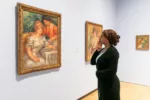Much has been said about the Barnes on the Parkway but what’s the plan for the Barnes’ Merion building once the collection moves? And — since the Barnes is first and foremost a collection with an educational mission –what about that education program? How will Barnes on the Parkway update its time-honored methods in its new high tech digs that include a video-equipped “Welcome” room, self-guided tours via hand-held Acoustiguides, and a 150 seat auditorium for concerts, movies, performances and lectures — all completely out of the picture now in the 1922 Barnes building in Merion? We sat down with Blake Bradford, the Barnes’ new Director of Education, to get some answers.

Bradford, 39, an affable and intense man with a sense of humor and some Philly connections, has been doing a lot of thinking about the future of the Barnes’ programs and buildings while shuttling back and forth between his office in Merion and the Barnes’ satellite offices in the former Philadelphia School Administration building on the Parkway. The Harriton High grad (BA, Williams; MA U of Texas) is part of a committee dubbed the Gang of Five charged with studying the idea of creating a Barnes research institute, an experimental arm of the foundation that would reach out to artists, writers, composers and scholars to bring the Barnes into a contemporary context through residency programs and educational programs that involve the public.
The recently-convened group is “very much in the pondering stage,” studying similar program models at places like the Rosenbach Museum, Skowhegan and the Clark Institute, Bradford says. The Barnes research institute might be a separate entity under the Barnes umbrella, however such experimental programming is in keeping with the philosophy of Albert Barnes. “When Barnes was alive he talked about what he was doing as an experiment,” Bradford says. Barnes had concerts in the galleries. He embraced music and literature as well as art, says Bradford.
A research institute at the Barnes would revive Barnes’ and John Dewey’s core idea that educating the public about the arts will enrich our democratic society. “This (research institute) is like what Barnes wanted to do with Penn (University of Pennsylvania) but was rebuffed,” says Bradford. (In the 1920s Barnes reached out to Penn to invite scholars and students to participate in projects at the Barnes. Mostly Penn wasn’t interested and Barnes turned to Lincoln University instead although that interaction fell short as well.)
Also, an experimental research institute will help break through people’s stereotype of what the Barnes is, says Bradford. The Barnes is not a museum; it’s not just a place to come and see the Renoirs and Cezannes. It’s a living institution whose core mission is the betterment of society through dialog about the arts.
While it’s far from clear what the research institute will look like two years from now it is likely that programming space will be in Merion where the large galleries housing the art collection will be freed up for other uses.
Meanwhile, we wanted to know more about how the education program will work in the new Parkway Barnes. First off, the three-year Barnes certificate program, which uses the Barnes method of teaching about art, will continue. “Barnes pedagogy is rooted in the Barnes experience. It’s a function of the collection–how the work is arranged. There is something inevitable about that,” says Bradford.
Yes, there will be hand-held electronic devices for self-guided tours, he says. But there will be docents as well and other trained educational staff. They don’t want people staring down at their Acoustiguides and missing the quiet experience of looking at the works themselves. “Our goal is to meet people at their need and to be considerate about that.”
“The hang (installation of the paintings and objects) is going to be the same; the galleries are going to be the same. It’s going to retain the domestic scale. We will comply with ADA requirements…. But “It won’t be the mosh-pit blockbuster experience. We’re not going to turn this place into Disneyland,” he says. “The integrity of what we do is really important.”
In addition “The message of how you engage will be different. The first thing you see will not be a fence and a guard house,” he says, referring to the “fortress Barnes” ambiance in Merion where walk-ins are not allowed and a guard checks your reservation before you set foot on the property.
There will be a large, high-ceilinged special exhibitions gallery, he says. “We would love to get the Art Institute’s “Island of Grande Jatte” as a temporary exhibit (Georges Seurat’s pointillist masterpiece). Will it happen? That’s unlikely, says Bradford. “People will be willing to lend us but will they lend the cornerstone of their collection?”
Adult class offerings will be expanded to focus on contemporary art, social history, Freudian analysis of art and other topics. Also, they will have “classroom inserts between the galleries (little rooms between galleries where classes can go to talk). All our teachers bring in supplemental resources to enrich the firsthand experience in the galleries,” he says.
In all cases, Bradford says, the focus will be true to Barnes’ original idea of “giving people simple tools to deal with the unknown.” Art was a means to an end for Barnes who saw it as a tool to educate and uplift the general populace. And that will continue.
Meanwhile we asked whether the Harriton grad had gone to the Barnes when he was a teen. “I never went to the Barnes until I was out of college. It sounded interesting, but there wasn’t much about it that yielded to even a curious teenager.”
Barnes Foundation, 300 N. Latches Lane, Merion. $15 Reservations required. Call (610) 667-0290, then press option 5. Opening on the Parkway, Spring 2012.









